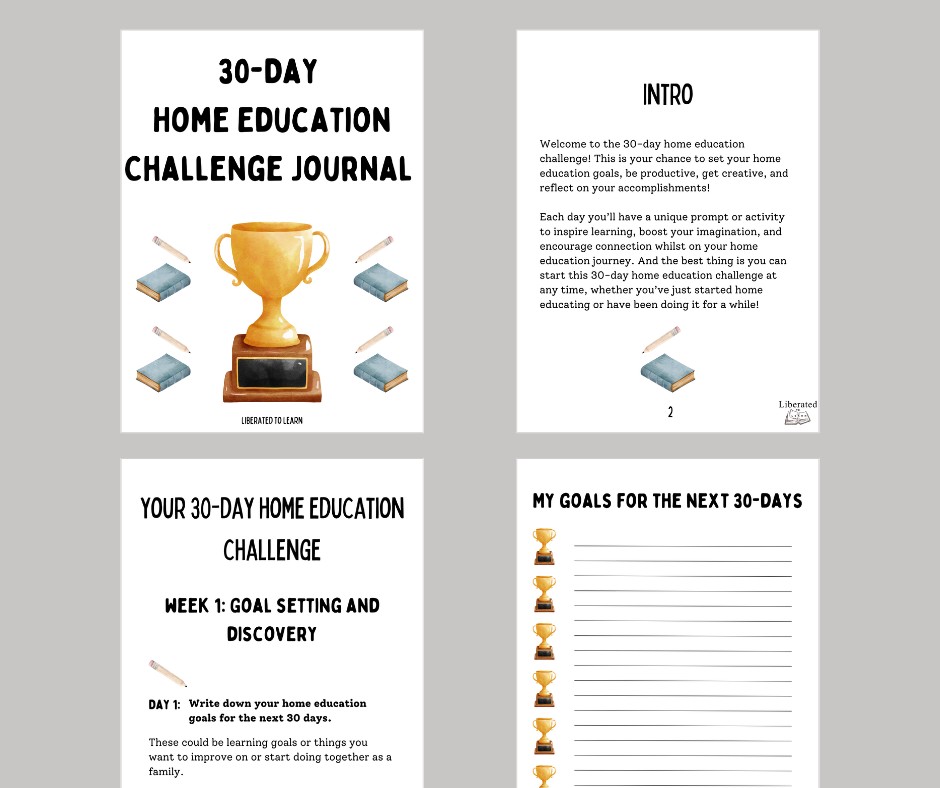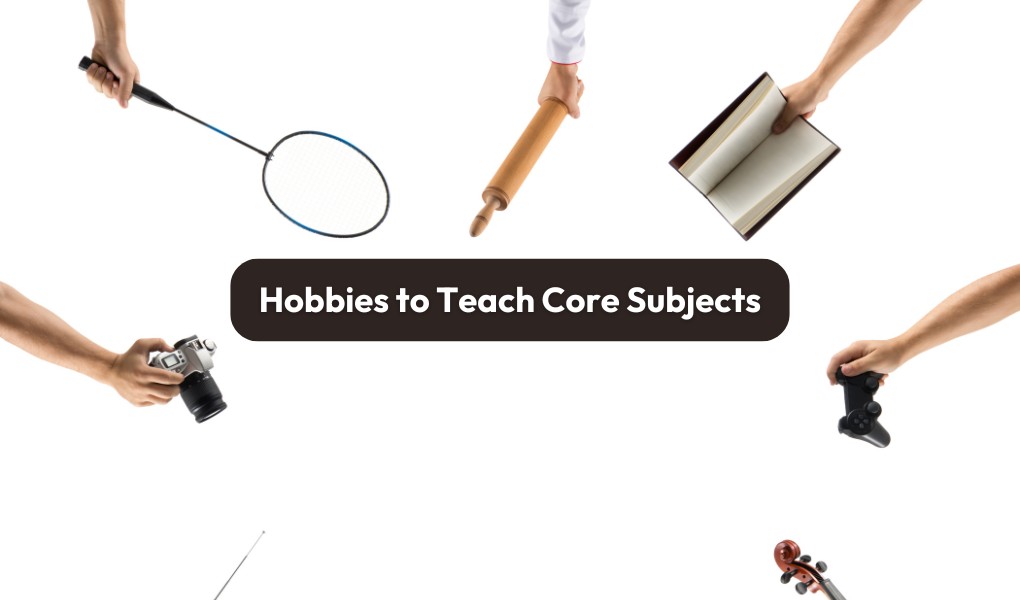Welcome to the 30-day home education challenge! This is your chance to set your home education goals, be productive, get creative, and reflect on your accomplishments!

Welcome to the 30-day home education challenge! This is your chance to set your home education goals, be productive, get creative, and reflect on your accomplishments!
Each day you’ll have a unique prompt or activity to inspire learning, boost your imagination, and encourage connection whilst on your home education journey. And the best thing is you can start this 30-day home education challenge at any time, whether you’ve just started home educating or have been doing it for a while!
Get started with your own journal or download the one we’ve created for you!

Tips for Completing This 30-Day Challenge
- Write down everything in your journal, including your thoughts and progress.
- Get your family involved and encourage them to do the daily prompts with you.
- Adapt the challenges if you need to, and switch activities if you can’t do them on a certain day.
- Set a reward for yourself for when you complete the challenge.
- Embrace flexibility because every home education journey is unique!
Your 30-Day Home Education Challenge

Week 1: Goal-Setting and Self-Discovery
Day 1: Write down your home education goals for the next 30 days.
These could be learning goals or things you want to improve on or start doing together as a family.
Day 2: Create your daily or weekly schedule.
Plan a daily or weekly schedule (even if you don’t have one). Define a part of the day for routine, whether it be the morning or evening, and break up the day or week into chunks for learning time, hobbies, and personal time.
Day 3: List your strengths and weaknesses.
Write down how you plan to use your strengths to work on your weaknesses.
Day 4: Create a vision board.
Get creative with a vision board based on your personal goals and your home education journey.
Day 5: It’s time for a hands-on activity.
Decide on a fun hands-on activity for the day and write about how it goes.
Why did you pick this specific activity? What did you learn from it?
Day 6: Try out a new hobby.
Pick a hobby that is new and interesting and one which you’ve never done before.
Day 7: Reflect on what worked well this week.
Think about what you’d also like to adjust for next week.
Week 2: Creativity and Exploration
Day 8: Get out in nature.
Go for a nature walk or immerse yourself outside. Why not start a nature journal too?
Day 9: Have an arts and crafts day.
Get creative and plan a day full of fun crafts and activities. Try something you’ve never done before. It could be sewing, wood carving, or something completely unique and based on your interests.
Day 10: Dive into a new topic for the entire day.
On separate pieces of paper, write down any topics that you are interested in learning about. Put the pieces of paper in a box or jar, shake them up, and then pick one out at random. Now you can spend the day learning about that particular topic and really diving into it.
Day 11: Have a board game and puzzle day.
Spend the day playing educational board games and doing puzzles and trivia quizzes. You could even have a go at creating your own.
Day 12: Go on a spontaneous day trip.
Be spontaneous and don’t plan where you’re going or what you’re going to do. Just grab what you normally need for days out and see where you find yourself.
Day 13: It’s time to get active.
Do an activity that requires a lot of energy or go and play a sport. Write down how exercise makes you feel and make a plan to keep active.
Day 14: Explore a different culture for the day.
Pick a country at random to learn about and fully immerse yourself in their culture for the day. Dress up in cultural clothes, cook and eat cultural foods, do cultural activities and celebrate their traditions.
Week 3: Productivity and Mindset
Day 15: Learn about growth mindset and write out your failures and mistakes.
After writing down your failures and mistakes, think about how they led you to bigger and better things. What did you then achieve as a result of failing?
Day 16: Start a gratitude journal.
Spend the day thinking about the things you are grateful for and write them down in a journal. Also think about why you are grateful for them.
Day 17: Learn a new life skill.
Pick a new life skill to learn and think about how you can implement it in your daily life or use it at some point in the future.
Day 18: Have a day of deep focus.
Limit distractions for the day and practise focusing on different tasks. Set timers for yourself and see how much you can get done, then reflect on what you’ve achieved.
Day 19: Track your habits.
Take note of your habits and write down any new habits that you’d like to start doing. Start a habit tracker and check off daily progress on a goal.
Day 20: Practise self-care for the day.
Learn about forms of self-care and how it can positively impact your mental health. Spend the day doing things that you enjoy and that are good for you.
Day 21: Have a declutter and reorganisation day.
Focus on decluttering your space, whether it’s your learning area or personal space, and get rid of things that you no longer need. Then reorganise and write down how you feel after it’s done.
Week 4: Reflection, Growth and Reconnecting
Day 22: Reflect on how home education has helped you connect with others or how it will help you connect if you’ve just started.
Write down ways you have connected with people or plan to.
Day 23: Interview a family member about their childhood education.
In what ways was it different to yours now? Is there anything they wished they could have changed or done differently? Has it influenced you to do things differently with your education?
Day 24: Plan a day of family time.
From the morning to the evening, plan how you will spend time with family. What will you do together? Then at the end of the day, write about what you’ve done and how it made you feel.
Day 25: Master a challenge or overcome a fear.
Whether it’s something you’ve been struggling to learn, or a mental or physical fear you want to overcome, find ways to help you master it and write about if it was successful or not.
Day 26: Plan for the future.
Start setting goals beyond these 30 days and plan for the future. Where do you see yourself and what do you want to achieve? Plan how you will get there.
Day 27: Have a digital detox day.
Get rid of technology for the day and focus on reconnecting. Write about what it’s like, what you do without screens, and how it makes you feel at the end of the day.
Day 28: Give back to the community.
Do a random act of kindness or contribute to a cause you care about. You could help a neighbour or a friend, donate old items, or start a project to help a charity. Write about how it made you feel afterwards and the reactions of other people.
Final Challenge
Day 29: What are your biggest takeaways from this challenge?
What have you enjoyed the most? What do you plan to keep on doing? Is there anything that has surprised you over the last four weeks?
Day 30: Plan how you will celebrate completing this 30-day home education challenge.

Get your FREE journal to complete this challenge!
We hope you enjoy this 30-day home education challenge. Let us know how you’re getting on in the comments!
You might also like: Weekly Journal Prompts for Home Education
Setting Goals for Home Education

m@liberated
Want more from Liberated to Learn?
Subscribe to stay updated about new posts, resources and giveaways!













